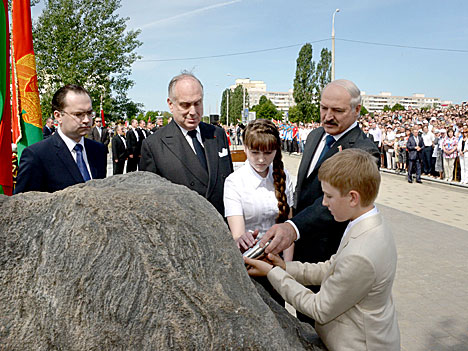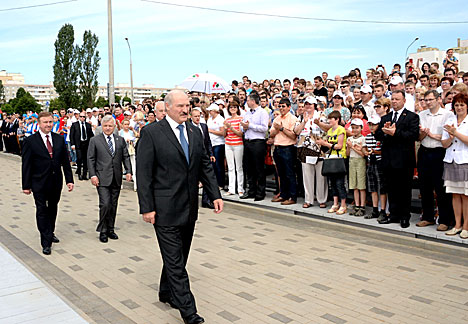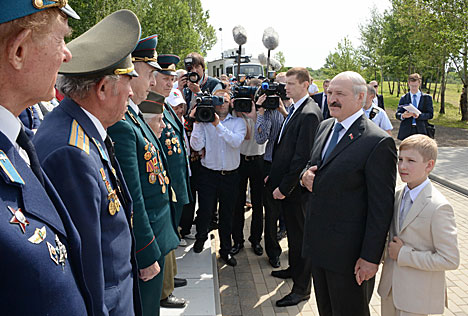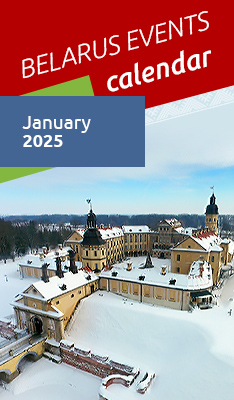News & Events in Belarus
Trostenets Memorial should become a site of pan-European significance

MINSK, 8 June (BelTA) – The Trostenets Memorial should become a site of pan-European significance, Belarus President Alexander Lukashenko said at the ceremony of laying a time capsule at the Trostenets Memorial on 8 June, BelTA has learned.
“The memorial should become a site of pan-European significance, revealing the antihuman essence of the Nazi policy against the peaceful population of Europe. It should serve as a tribute to the memory of the generations that came through all the ordeals of the 20th century, a Mecca for people who value humanism and peaceful future,” the President said.
 Alexander Lukashenko stressed that the Trostenets concentration camp was the biggest place of mass killings in the Soviet Union alongside with the Oswiecim, Majdanek and Treblinka extermination camps. The Nazis killed here over 200,000 people of various confessions and nationalities, Slavs, Jews, Gypsies, many others. “In 1944 the troops that liberated Belarus from the Nazis saw the ash of still warm furnaces and were stricken by the inhuman crimes committed in Trostenets over the years. On the area of more than 100 hectares the Nazis set up a real death factory. Our partisans and undergrounders, prisoners of war and civilians were tortured and killed behind the barbed wire. Thousands of Jews were herded here from the Minsk ghetto and West-European countries,” the head of state noted.
Alexander Lukashenko stressed that the Trostenets concentration camp was the biggest place of mass killings in the Soviet Union alongside with the Oswiecim, Majdanek and Treblinka extermination camps. The Nazis killed here over 200,000 people of various confessions and nationalities, Slavs, Jews, Gypsies, many others. “In 1944 the troops that liberated Belarus from the Nazis saw the ash of still warm furnaces and were stricken by the inhuman crimes committed in Trostenets over the years. On the area of more than 100 hectares the Nazis set up a real death factory. Our partisans and undergrounders, prisoners of war and civilians were tortured and killed behind the barbed wire. Thousands of Jews were herded here from the Minsk ghetto and West-European countries,” the head of state noted.
“Belarus that lost every third resident will never forget these horrible pages of its history,” the Belarusian leader emphasized.
The President said that historians and architects had developed a large-scale concept of the memorial. State funds will be allocated for its construction. The international community expressed a wish to make its contribution to the perpetuation of the Nazi victims. “Today, on the eve of the celebration of the 70th anniversary of Belarus' liberation from the Nazis, we launch the construction of the memorial and lay a time capsule for our future generations,” Alexander Lukashenko said.
 The head of state addressed the relatives of the Trostenets prisoners that came from all over Belarus as well as from Austria, Germany, Israel, Poland, the Czech Republic, the United States and other countries: “Together with the Belarusian people I share your grief and the loss of your fathers, mothers, brothers and sisters, grandfathers and great-grandfathers.”
The head of state addressed the relatives of the Trostenets prisoners that came from all over Belarus as well as from Austria, Germany, Israel, Poland, the Czech Republic, the United States and other countries: “Together with the Belarusian people I share your grief and the loss of your fathers, mothers, brothers and sisters, grandfathers and great-grandfathers.”
The President thanked foreign guests and diplomats who saw it as their moral and human duty to pay tribute to the people killed in Trostenets.
“In these minutes of common grief we mentally address the cherished memory of everyone who fell victim to the Nazi crimes, silent shadows of women, old people and children who invisibly surround us here. And we are solid in saying: “Nevermore!”. This fanatic craziness should never repeat. The ideas of xenophobia, dominance and ethnic intolerance should never triumph,” the Belarusian leader said.
 “We will do everything to keep mutual respect, tolerance and concord on the Belarusian land, with the principles of humanity and goodwill prevailing. Cherish peace in your homes and the good in your hearts, only then we will never see such things repeating,” Alexander Lukashenko said.
“We will do everything to keep mutual respect, tolerance and concord on the Belarusian land, with the principles of humanity and goodwill prevailing. Cherish peace in your homes and the good in your hearts, only then we will never see such things repeating,” Alexander Lukashenko said.
| Su | Mo | Tu | We | Th | Fr | Sa |
|---|---|---|---|---|---|---|








 print version
print version make home page
make home page add to bookmarks
add to bookmarks

